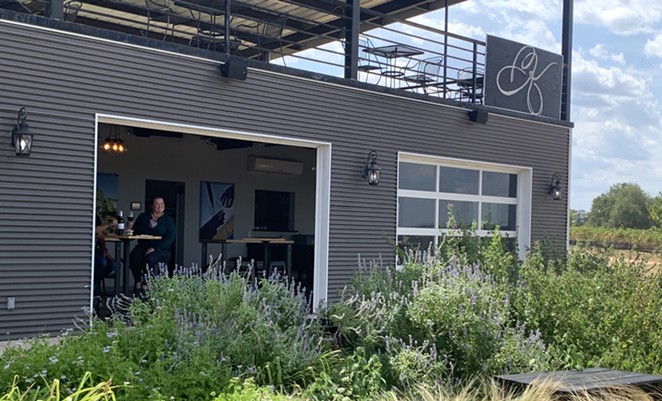A Texas Rule Change Allows Some Bars to Reopen as Restaurants, but Challenges Abound

When Chris and Jennifer Cobb opened Kuhlman Cellars in October 2014, they viewed their north-of-San Antonio winery as the next stage of their “wine life,” not a foray into the restaurant trade.
But, now, as the COVID-19 pandemic wreaks havoc on their industry, the Cobbs have little choice but to get into that business.
To meet new Texas Alcoholic Beverage Commission guidelines that allow bars, breweries and wineries to reclassify as restaurants and stay open during the pandemic, the Cobbs have amped up their food game.
“If you’d asked me before the pandemic if I wanted Kuhlman to be a restaurant, I’d have said, ‘absolutely not!’” Jennifer Cobb said. “Now, [TABC says], ‘you have to be a restaurant to serve your wine to guests,’ so I’m thinking, ‘OK, let’s do this.’”
From its inception, the winery has offered bite-sized nibbles to complement tastings of its products. But the food items, developed by local chef Chris Cook, weren’t exactly meant to be the star of the show.
“Before, we thought it would be too challenging, logistically, to offer food in a larger format,” Cobb said. “We just had to figure out. In tough times, you figure it out.”
Cobb says expanding Kuhlman’s tasting bites into full-size entrees so it could reopen its tasting room was a “no-brainer.”
“It fit our brand and gave us the opportunity to meet the need of guests who have been asking for this for a long time,” she said. “It also allows us to adhere to new legislation, which in turn allows us to serve our wine.”
For the team at Kuhlman, an upgrade to the tasting menu took creativity and overcoming logistical challenges — namely the fact that its food-prep facilities were never intended to prepare full meals.
Operating Challenges
Even for bars with full kitchens, reconfiguring to become a restaurant isn’t exactly easy.
Joseph Valenzuela, co-owner of the Northside beer haven Hoppy Monk, said he welcomes the recent rule change but warns that the damage was already been done after Gov. Greg Abbott closed bars for a second time on June 26.
“The Texas government isn’t doing us any favors in terms of allowing us to contribute to the economy in a positive way,” said Valenzuela, whose establishment serves lunch, dinner and Sunday brunch.
Only in the last few days has the Hoppy Monk been able to offer to-go sales of any of the 99 beers it offers on tap.
After almost five months of sitting idle, the product housed inside its massive beer cooler is in danger of going stale, effectively becoming costly wasted product for the business.
“Draft beer is the center point of our business,” Valenzuela said. “At this point, I’m sure that we’re going to find that a number of kegs will no longer be fit to sell.”
‘None of It Makes Sense’
Such a substantial loss of product would be another devastating blow to the business.
“We are sitting on a large amount of beer inventory,” Hoppy Monk General Manager Amanda Casas said.
In July, State Sen. Bryan Hughes, R-Mineola, and State Rep. Matt Krause, R-Fort Worth, penned a letter to Governor Abbott, requesting adjustment of his executive order that would allow a businesses such as Hoppy Monk to operate as a restaurant.
Though the document was signed by 14 state senators — including José Rodríguez from Valenzuela’s hometown of El Paso — and 50 state reps, its authors have yet to receive a response.
“What [Gov. Abbott] doesn’t understand is, this is a perishable product,” Valenzuela said. “Despite having this proposal on his desk, he’s failed to address it.”
In the meantime, the Hoppy Monk has reopened to serve food and drink curbside so it can get its employees back to work.
“A lot of our people have been very anxious,” Casas said. “We’ve been trying to give them as many updates as we can, because this all has taken such a toll on them mentally.”
Focus on Safety
As establishments such as Kuhlman Cellars and the Hoppy Monk shake up their operations to survive, their owners say consumers should recognize the dedication to safety they’re showing as they reopen.
“We had to take a break and regroup, and we’ve done a lot of research on how to safely reopen,” Casas said. “It’s complicated to try to explain the technicalities of our licensing to consumers. But we’ve got to do what we can to get our team back to work.”
Kuhlman’s Cobb said her team worked tirelessly to develop specific plans to ensure safety when serving the new entree items, including packaging the fare in individual containers.
“We are so proud of our team, because this whole process has been stressful in many different ways,” she said. “Even if it’s a little bit different than it was before, we’re just excited to share all of these new things with our customer base — to feel sort of normal again.”
So many restaurants, so little time. Find out the latest San Antonio dining news with our Flavor Friday Newsletter.

















